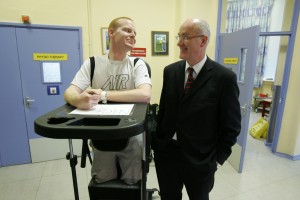Acquired Brain Injury and Stroke Specialty Programmes
The National Rehabilitation Hospital (NRH) provides comprehensive inpatient and outpatient services to patients who, as a result of an accident, illness or injury, have acquired a physical or cognitive disability and who require specialist medical rehabilitation.

Family members are encouraged to participate in your rehabilitation programme
The Consultant led Brain Injury Programme and the Stroke Specialty Programme at the NRH are backed by experience, clinical expertise and a solid reputation for excellence.
The Interdisciplinary Team within the Brain Injury and Stroke Specialty Programmes provide specialised rehabilitation treatment and care, designed to assist people with a diagnosis of Acquired Brain Injury (ABI) and Stroke to:
- Adjust to their injury
- Achieve the safest possible level of physical independence
- Participate socially and in the community
Read more
The Brain Injury and Stroke Teams work together with patients and their families and carers to achieve the best possible outcome from the Rehabilitation Programme, which is tailored to meet each patient’s individual needs.
Patients admitted to the Brain Injury and Stroke Programmes at the NRH have typically sustained a complex, acquired, non-progressive neurological disability following:
- Traumatic brain injury
- Stroke
- Brain haemorrhage
- Other neurological conditions
The service offers Interdisciplinary rehabilitation to patients ranging from:
- Patients who remain in the near coma state, minimally conscious state and locked-in syndrome
- Patients with major physical and cognitive disability
- Patients who sustain a disabling initial head injury or a stroke, but recover the potential to return at least in part to their pre-injury role in society.
The full Scopes of Service for the Brain Injury Programme and Stroke Specialty Programme are detailed in the linked documents.
Show less
Rehabilitation Teams in the Brain Injury and Stroke Programmes
Read more
Patient care and treatment for the Brain Injury and Stroke Specialty Programmes is delivered by interdisciplinary teams (Medical, Nursing, Health and Social Care Professionals), with clinical responsibility led by Dr Raymond Carson (Medical Director for the BI Programme) and Dr Kinley Roberts (Medical Director for the Stroke Specialty Programme)
In addition, Consultants in Rehabilitation Medicine who provide a service to these Programmes include:
- Prof. Jacinta Morgan
- Dr. Jacinta McElligott
- Dr. Paul Carroll
The Programme Manager for the Brain Injury and Stroke Specialty Programmes is Kate Curtin
The NRH is one of the largest rehabilitation hospitals in Europe. A programme to increase the number of Consultants in Rehabilitation Medicine, in line with International best practice, is being actively pursued.
At the NRH, the Brain Injury and Stroke Specialty services access the full complement of support from:
- Medical
- Nursing and clinical support
- Therapy services
- Patient Services (administration)
Input is also required from Neuropsychiatry, Gastroenterology, Endocrinology, Ophthalmology, and ENT.
Show less
Follow the links to find out more about the:
NRH Stroke Specialty Programme
Patient and Family Information Leaflets
A range of Patient & Family Information Leaflets are available to download.
Acquired Brain Injury and Stroke Programme Referrals
Read more
In addition to referrals from hospitals in which NRH Consultants have sessional commitments, each consultant also receives written referrals from regional hospitals, including Cork University Hospital which, along with Beaumont Hospital, is one of the two major neurosciences centres in Ireland.
While early rehabilitation of patients with acquired complex neuro-disability typically starts in the Neurosciences Unit in Beaumont Hospital and Cork University Hospital, a significant percentage of patients do not require neurosurgical intervention and therefore come directly from the acute hospitals throughout the country.
The NRH attracts referrals involving people who have acquired very severe disability such as Prolonged Disorders of Consciousness (PDoC) state, and is continuing to enhance its skills in providing services to people with severe complex disability within a wide-ranging Interdisciplinary team.
General Practitioner referrals appear to be increasing and this may reflect the advances in rehabilitation services in recent years which can provide benefits to patients who sustained their disability many years ago. However, the pattern of increasing General Practitioner referrals may also reflect a cohort of new patients discharged from acute hospitals who wish to access further specialist rehabilitation at the NRH.
Link to referral criteria and medical Referral Form.
Continuous Improvement
Improving the quality of patient treatment and improving access for patients on the waiting list is of the highest priority at NRH. Additional Outreach and Community based rehabilitation services are urgently required in order to achieve this aim.
Strategic Matters
Strategic involvement by NRH Personnel Includes
- Cardiovascular Strategy for Stroke
- National Policy and Strategy for the Provision of Rehabilitation Services
Show less

